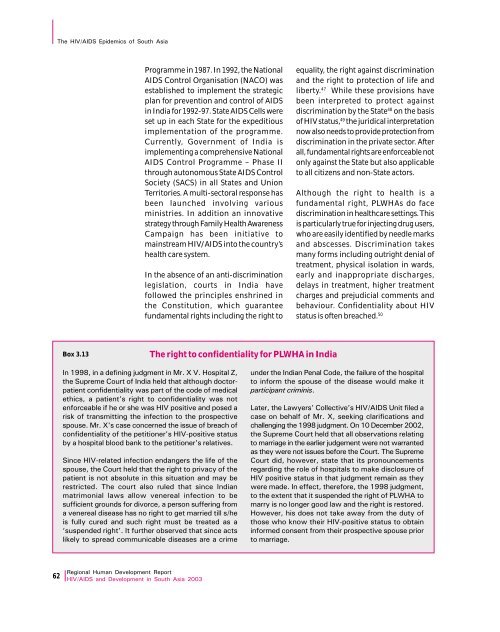Download Report - UNDP Asia-Pacific Regional Centre - United ...
Download Report - UNDP Asia-Pacific Regional Centre - United ...
Download Report - UNDP Asia-Pacific Regional Centre - United ...
Create successful ePaper yourself
Turn your PDF publications into a flip-book with our unique Google optimized e-Paper software.
The HIV/AIDS Epidemics of South <strong>Asia</strong>Programme in 1987. In 1992, the NationalAIDS Control Organisation (NACO) wasestablished to implement the strategicplan for prevention and control of AIDSin India for 1992-97. State AIDS Cells wereset up in each State for the expeditiousimplementation of the programme.Currently, Government of India isimplementing a comprehensive NationalAIDS Control Programme – Phase IIthrough autonomous State AIDS ControlSociety (SACS) in all States and UnionTerritories. A multi-sectoral response hasbeen launched involving variousministries. In addition an innovativestrategy through Family Health AwarenessCampaign has been initiative tomainstream HIV/AIDS into the country’shealth care system.In the absence of an anti-discriminationlegislation, courts in India havefollowed the principles enshrined inthe Constitution, which guaranteefundamental rights including the right toequality, the right against discriminationand the right to protection of life andliberty. 47 While these provisions havebeen interpreted to protect againstdiscrimination by the State 48 on the basisof HIV status, 49 the juridical interpretationnow also needs to provide protection fromdiscrimination in the private sector. Afterall, fundamental rights are enforceable notonly against the State but also applicableto all citizens and non-State actors.Although the right to health is afundamental right, PLWHAs do facediscrimination in healthcare settings. Thisis particularly true for injecting drug users,who are easily identified by needle marksand abscesses. Discrimination takesmany forms including outright denial oftreatment, physical isolation in wards,early and inappropriate discharges,delays in treatment, higher treatmentcharges and prejudicial comments andbehaviour. Confidentiality about HIVstatus is often breached. 50Box 3.13The right to confidentiality for PLWHA in IndiaIn 1998, in a defining judgment in Mr. X V. Hospital Z,the Supreme Court of India held that although doctorpatientconfidentiality was part of the code of medicalethics, a patient’s right to confidentiality was notenforceable if he or she was HIV positive and posed arisk of transmitting the infection to the prospectivespouse. Mr. X's case concerned the issue of breach ofconfidentiality of the petitioner's HIV-positive statusby a hospital blood bank to the petitioner's relatives.Since HIV-related infection endangers the life of thespouse, the Court held that the right to privacy of thepatient is not absolute in this situation and may berestricted. The court also ruled that since Indianmatrimonial laws allow venereal infection to besufficient grounds for divorce, a person suffering froma venereal disease has no right to get married till s/heis fully cured and such right must be treated as a‘suspended right’. It further observed that since actslikely to spread communicable diseases are a crimeunder the Indian Penal Code, the failure of the hospitalto inform the spouse of the disease would make itparticipant criminis.Later, the Lawyers’ Collective’s HIV/AIDS Unit filed acase on behalf of Mr. X, seeking clarifications andchallenging the 1998 judgment. On 10 December 2002,the Supreme Court held that all observations relatingto marriage in the earlier judgement were not warrantedas they were not issues before the Court. The SupremeCourt did, however, state that its pronouncementsregarding the role of hospitals to make disclosure ofHIV positive status in that judgment remain as theywere made. In effect, therefore, the 1998 judgment,to the extent that it suspended the right of PLWHA tomarry is no longer good law and the right is restored.However, his does not take away from the duty ofthose who know their HIV-positive status to obtaininformed consent from their prospective spouse priorto marriage.62<strong>Regional</strong> Human Development <strong>Report</strong>HIV/AIDS and Development in South <strong>Asia</strong> 2003
















